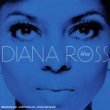Buried in the Motown vaults for over three decades, the much talked-about Diana Ross album Blue emerged in June 2006. It is not surprising that the hit-obsessed Motown of 1972 chose to shelve the project, but it is sickening that this enjoyable disc didn't see the light of day so that Diana could release saccharine stuff like "Touch Me In the Morning."
Anyone listening to Blue as an authentic "jazz" album will undoubtedly be disappointed. But looking it instead as a fun Diana Ross diversion from the prototypical Motown material of the early 70s allows the disc to be enjoyed without the burden of unfair expectations. So a listener can breeze by tired production of pieces like "Smile" and "But Beautiful" and can get to some delicately aloof performances by Ross on "What A Difference A Day Makes," "You've Changed" and "I Can't Get Started With You" that make the album worthwhile.
Buried in the Motown vaults for over three decades, the much talked-about Diana Ross album Blue emerged in June 2006. It is not surprising that the hit-obsessed Motown of 1972 chose to shelve the project, but it is sickening that this enjoyable disc didn't see the light of day so that Diana could release saccharine stuff like "Touch Me In the Morning."
Anyone listening to Blue as an authentic "jazz" album will undoubtedly be disappointed. But looking it instead as a fun Diana Ross diversion from the prototypical Motown material of the early 70s allows the disc to be enjoyed without the burden of unfair expectations. So a listener can breeze by tired production of pieces like "Smile" and "But Beautiful" and can get to some delicately aloof performances by Ross on "What A Difference A Day Makes," "You've Changed" and "I Can't Get Started With You" that make the album worthwhile.
It has become passe for soul performers to cut albums of pop standards (this Summer alone will bring similar releases from Smokey Robinson and Gladys Knight), but in 1972 it was a stretch for an artist at the top of her game to do so. And while Blue's trite pop arrangements and overuse of string sections haven't aged particularly well, Diana Ross sounds great throughout and reminds us of her underrated talent as a song stylist.
by Chris Rizik

